My Childhood Class 9 Extra Questions and Answers CBSE English Chapter 6 NCERT Beehive– Extract Based Questions MCQs Short Answer Questions Long Answer Questions and Value Based Questions
MY CHILDHOOD
(Extra Questions)
Extract Based Questions
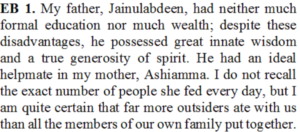

(ii) Which two qualities ‘my father’ possessed?
(iii) Which word in the extract is synonym of ‘in spite of ’?
(iv) Who is referred as ‘I’ in this extract?
(iv) Whose number was less – outsiders eating food or family members?
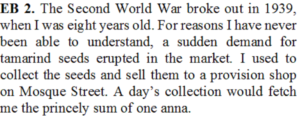

(ii) What was ‘I’ not able to understand?
(iii) Where was the provision shop situated?
(iv) Which word as used in the extract represents part of a rupee?
(v) Which phrase as used in the extract mean ‘large amount of money’?


(ii) On which station the newspapers used to be thrown?
(iii) Who distributed newspapers?
(iv) Who gave the first salary to the narrator?
(v) Which word in the extract mean ‘vacancy’?


(ii) Who became the high priest later?
(iii) Who felt the difference amongst themselves during childhood?
(iv) Who became the catering contractor?
(v) Who started a transport business?
(vi) Which word in the extract pertains to ‘supply of food’?


(ii) In which class was ‘I’ studying then?
(iii) What identified the narrator as a Muslim?
(iv) Who used to sit next to the author?
(v) In which row narrator used to sit?
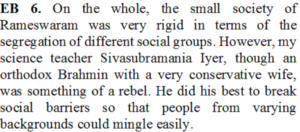

(ii) What subject Sivasubramania Iyer used to teach?
(iii) To whom does the word ‘he’ refer to in above extract?
(iv) Which word in the extract is synonymous of ‘revolutionary’?
(v) What did ‘he’ want to break?
(vi) Which word as used in the extract is synonymous of ‘mix’?
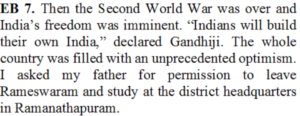

(ii) Did India get freedom before end of Second World War?
(iii) Which word in the extract mean ‘hopefulness’.
(iv) Why did I want to leave Rameswaram?
(v) Name the place to which ‘I’ wanted to go?
(vi) Whose permission did ‘I’ seek?
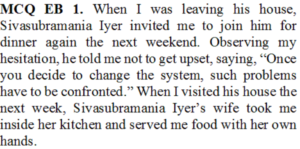

(a) student, teacher
(b) husband, wife
(c) teacher, student
(d) student, husband
(ii) When was ‘I’ invited again for dinner?
(a) yesterday
(b) last weekend
(c) this weekend
(d) next weekend
(iii) Which word in the extract is synonymous to ‘faced’?
(a) invited
(b) confronted
(c) upset
(d) hesitation
(iv) Where was ‘I’ served food on the next occasion?
(a) outside the kitchen
(b) away from kitchen
(c) in the kitchen
(d) in the veranda
(v) Based on the extract please classify following as fact and opinion
1. ‘I’ hesitated to accept the invitation
2. Iyer should have informed his wife about visit of ‘I’
3. The lady of the house served food with her own hands
4. Since his childhood Mr. Iyer was a courageous person
(a) F -1,2 and O -3,4
(b) F- 1,4 and O- 2,3
(c) F – 3,4 and O – 1,2
(d) F – 1,3 and O – 2,4
(vi) Which of the following task Mr. Iyer did not perform?
(a) he invited the narrator
(b) he explained his determination
(c) he got angry at his wife
(d) he was quick to observe narrator’s hesitation
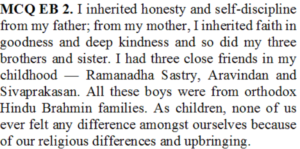

(a) two
(b) three
(c) four
(d) five
(ii) The narrator has claimed that
(a) his friends differentiated on the basis of upbringing
(b) his friends differentiated on the basis of religion
(c) his friends were from orthodox families
(d) his friends were four in number
(iii) An expression ‘so did’ has been used in the extract. Which of the following is not the correct use of similar expression?
(a) My father played football, so did I
(b) My mother cooked nice food, so did my sister
(c) My neighbour was an able person, so did his son
(d) My brother wrote good poetry, so did my nephew.
(iv) Based on the extract please classify following as fact and opinion
1. I inherited honesty from my father.
2. Father must have been a brave person.
3. I inherited deep kindness from my mother
4. My siblings also inherited same qualities.
(a) F -2,3 and O- 1,4
(b) F – 1,2 and O – 3,4
(c) F – 1,3 and O – 2,4
(d) F – 1,3,4 and O -2
(v) Which word as used in the extract is synonym of ‘traditional’?
(a) inherited
(b) upbringing
(c) orthodox
(d) close
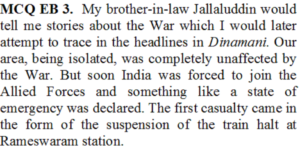

(a) Jallaluddin
(b) Dinamani
(c) Allied Forces
(d) Rameswaram
(ii) Who narrated stories of World War?
(a) narrator’s father
(b) narrator’s mother-in-law
(c) narrator’s mother
(d) narrator’s brother-in-law
(iii) What was the first important impact at Rameswaram of India joining the Second World War.
(a) Train halts increased
(b) Train halt was suspended
(c) Train halt was decreased
(d) Train halt was constant
(iv) Why was ‘our area’ unaffected by the war?
(a) It was a plain area
(b) It was a hilly area
(c) It was an isolated area
(d) It was a coastal area
Short Answer Questions (30-40 words)


Mother and grandmother narrated bedtime stories to children.
Thus Kalam says that his childhood was secure materially and emotionally.








Owing to this reason both Kalam and his friend became sad.


The wife of teacher had orthodox thoughts. She did not serve food to him in her kitchen. However on second occasion she herself served him food in the kitchen.


Therefore Kalam says that he was something of a rebel.
Long Answer questions (100-120 words)


During celebration of Shri Sita Rama Kalyanam ceremony family of Kalam used to arrange boats that had special platforms. These boats were used to carry idols of Rama to the site of marriage.
Mother and grandmother of Kalam used to narrate bedtime stories about Ramayana and life of Prophet.
The science teacher guided Kalam to the best of his ability. He had invited Kalam to dine at his house.
Above incidents prove that both groups lived in harmony.


Now the newspapers from the train had to be bundled and thrown from the moving train at Rameswaram Road station. Samsuddin, cousin of Kalam, was in the business of distributing newspaper. Now he required help to collect bundles of newspapers.
Samsuddin hired Kalam for this work. This is how Kalam earned his first wages. Kalam felt very happy and proud to earn money on his own.
****
NO MEN ARE FOREIGN
(Extra Questions)
Extract Based Questions


(ii) Whose uniform is being referred to in second line of the extract?
(iii) According to extract, is the earth regarded differently by people?
(iv) What does poet say about breathing?


(ii) Which word in the extract is antonym of ‘ignorant’
(iii) Which poetic device has been used in the third line of the extract?
(iv) What is the meaning of last line of the extract?


(ii) Which poetic device is used in the first line of the extract?
(iii) In reference to third line of extract what is common in every part of earth?
(iv) Which word in the extract is synonym of ‘comprehend?
(v) According to extract how people can be won ?


(ii) According to extract when do we condemn ourselves?
(iii) What does the phrase ‘take arms against each other’ mean?
(iv) Which poetic device has been used in first line of the extract?


(ii) According to extract what is common to all people?
(iii) According to extract what do we pollute?
Short Answer Questions (30-40 words)


Therefore poet considers all people similar.






So war causes damage to whole human kind and the Mother Nature. So we should never engage in wars.


So eyes of all people do the same function.


Long Answer questions (100-120 words)


Who can ever forget the extent of damage caused due to the two World Wars we have fought. The whole economy of the world had suffered. So many people had lost lives and livelihood. The devastation caused by dropping of nuclear bombs is beyond imagination.
On the lesser front, wars within smaller society has also left permanent scars. The policy of apartheid has left a sore taste to all. Ethnic violence that erupts here and there too causes severe damage to society.
Thus war is certainly bad for human kind.
****


0 Comments